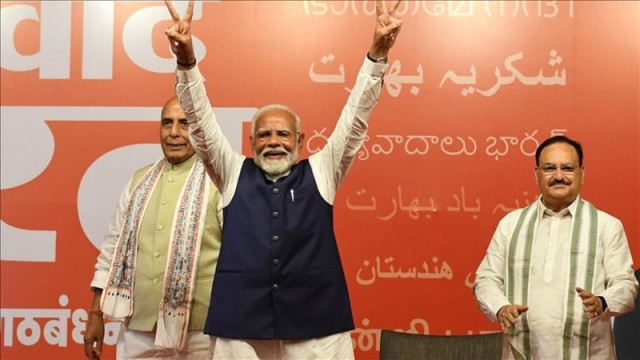Who is Modi's ruling party banking on to form new Indian govt?
Short of 272-seat majority in general elections, BJP will be supported by Telugu Desam Party, Janata Dal (United)

There are at least two major alliance partners on which the Indian ruling Bharatiya Janata Party will be banking to form the government after the ruling party remained short of the 272-seat majority in Tuesday’s vote count of Indian general elections.
The two allies are the Telugu Desam Party (TDP) and Janata Dal (United) who are the regional partners of the ruling National Democratic Alliance (NDA) which is now set to return to power, with Narendra Modi as the prime minister for the third consecutive term.
The Telugu Desam Party is headed by Chandrababu Naidu, a former chief minister of southern Andhra Pradesh state. His party won 16 seats, according to Tuesday’s vote count.
Janata Dal (United) is headed by Nitish Kumar, who is currently the chief minister of India’s Bihar state. Kumar, who is known for switching political alliances frequently, returned to NDA earlier this year and was the key player behind the formation of the opposition alliance INDIA. Kumar’s party won 12 seats in Tuesday's result.
According to final results announced by the Indian Election Commission, the ruling Bharatiya Janata Party (BJP) won 240 seats in the 543-member lower house of parliament, while the main opposition Indian National Congress got 99 seats.
The BJP, however, remained short of the 272-seat majority on its own.
In 2019, the BJP won 303 seats, while it achieved an absolute majority in 2014 by securing 282 seats. The Congress party won 44 and 52 seats in 2014 and 2019 elections respectively.
Read also: India election throws up surprise as Modi's alliance scrapes past majority
Tuesday's results, however, showed the NDA alliance won over 272 seats, the number required to form the government, while the opposition alliance secured over 230 seats.
According to political experts, Modi's third term is likely to be difficult under the coalition government.
“In India, we have two models of coalition politics. First is a single majority party, which as a courtesy party would include the alliance partners, and then secondly, we have a model where no party has a clear majority and hence a coalition,” Indian political commentator Rasheed Kidwai told Anadolu.
He said it is difficult to imagine how Prime Minister Narendra Modi will be able to run the third term with such a coalition. He said that in a coalition government, there are a lot of “demands, posturing, from the ally partners.”
Before voting in the marathon six-week election kicked off on April 19, Modi's alliance had set a target of 400 seats and 370 for his own party.
Among Tuesday’s winners is also jailed Sikh separatist Amritpal Singh, who won a seat from northern Punjab state. Singh, who revived calls for an independent Sikh homeland in Punjab, is currently lodged in a jail in northeast India.



















COMMENTS
Comments are moderated and generally will be posted if they are on-topic and not abusive.
For more information, please see our Comments FAQ